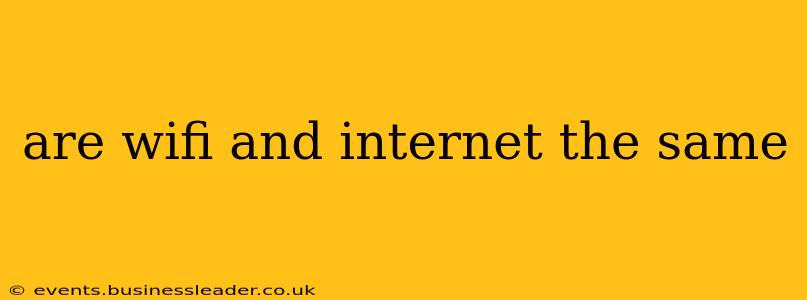Many people use the terms "Wi-Fi" and "internet" interchangeably, but they're not the same thing. While they work together to let you browse the web, stream videos, and connect with friends online, they represent distinct aspects of your online experience. This article will clarify the difference and answer some frequently asked questions.
What is the Internet?
The internet is a vast, global network of interconnected computer networks. Think of it as a massive highway system connecting billions of devices worldwide. This network allows for the exchange of information, including websites, emails, videos, and much more. The internet itself isn't a physical thing you can touch; it's a concept representing the interconnectedness of these networks. To access the internet, you need a connection to one of these networks.
What is Wi-Fi?
Wi-Fi is a wireless technology that allows devices like laptops, smartphones, and tablets to connect to the internet (or a local network) without the use of cables. It's a specific type of radio frequency technology that uses radio waves to transmit data. Your home router uses Wi-Fi to broadcast a signal that your devices can connect to. Think of Wi-Fi as one of the many access points to the internet highway.
Can you have Wi-Fi without the internet?
Yes! You can absolutely have a Wi-Fi network without an internet connection. Imagine a small office network where computers share files and printers locally. This network uses Wi-Fi to communicate, but it doesn't necessarily connect to the global internet. Your home Wi-Fi router can also operate without an internet connection; you'll simply be unable to access online services.
Can you have the internet without Wi-Fi?
Yes, you can access the internet without Wi-Fi. This is done through a wired connection, such as an Ethernet cable connecting your device directly to your modem or router. Wired connections are generally faster and more reliable than wireless connections, although they're less convenient due to the physical cable. Dial-up internet was another example of internet access without Wi-Fi, although that technology is largely obsolete.
How do Wi-Fi and the internet work together?
Your internet service provider (ISP) provides you with an internet connection. This connection usually comes into your home via a cable, fiber optic line, or satellite. Your modem receives this connection and your router (often combined with a modem into one unit) creates a Wi-Fi network, allowing your wireless devices to access the internet through the router. Essentially, the router acts as a bridge between your internet connection and your Wi-Fi-enabled devices.
What are the differences between Wi-Fi and internet speed?
Wi-Fi speed refers to the rate at which data is transferred over your Wi-Fi network. This can be affected by many factors including the router's capabilities, distance from the router, interference from other devices, and the quality of your router's signal. Internet speed, on the other hand, refers to the rate at which data is transferred through your internet connection provided by your ISP. Your internet speed will be limited by your ISP's plan and the underlying infrastructure. You can have a fast internet connection but slow Wi-Fi speed if your router is outdated or poorly positioned, for instance.
In short, while Wi-Fi is a way to access the internet, the internet itself is the global network of interconnected networks providing the information and services. They're distinct but interdependent components of our digital world.
